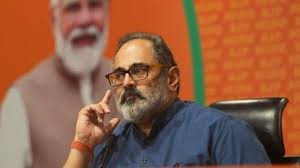Kerala BJP President Rajeev Chandrasekhar has strongly defended the Waqf (Amendment) Bill, stating that it is not targeted against any community but rather seeks to align existing laws with India’s constitutional values. He highlighted that several Christian organizations, including the Kerala Catholic Bishops Council (KCBC), support the bill, citing concerns over land claims by the Waqf Board, which have affected residents in areas like Munambam, near Kochi.
Chandrasekhar urged Kerala’s Members of Parliament (MPs) to prioritize the welfare of the affected citizens rather than engage in what he called “appeasement politics.” He noted that hundreds of poor families in Munambam are facing the threat of land seizures by the Waqf Board, leading to ongoing protests. He called on MPs to stand up for the people and support the bill to ensure a fair resolution.
Backing his stance, Union Parliamentary Affairs Minister Kiren Rijiju criticized what he called misleading propaganda against the bill. Rijiju reaffirmed that the bill is meant to protect the rights of all Indian citizens, welcoming the KCBC’s endorsement of the proposed amendments.
Finance Minister Nirmala Sitharaman also supported the KCBC’s position, describing their demand for changes to “unfair” and “anti-constitutional” sections of the existing Waqf Act as a necessary reform.
The KCBC has urged Kerala MPs to vote in favor of the bill, arguing that current provisions legitimize “illegal claims” and deny rightful land ownership to affected residents. Their appeal comes as approximately 610 families in Munambam continue their protests against the Waqf Board’s land claims.
The Waqf (Amendment) Bill aims to address these legal concerns by modifying sections of the existing law that stakeholders deem unjust and unconstitutional. Supporters argue that the bill is a step toward justice and fairness, ensuring that all citizens’ property rights are upheld, irrespective of their religious background.




